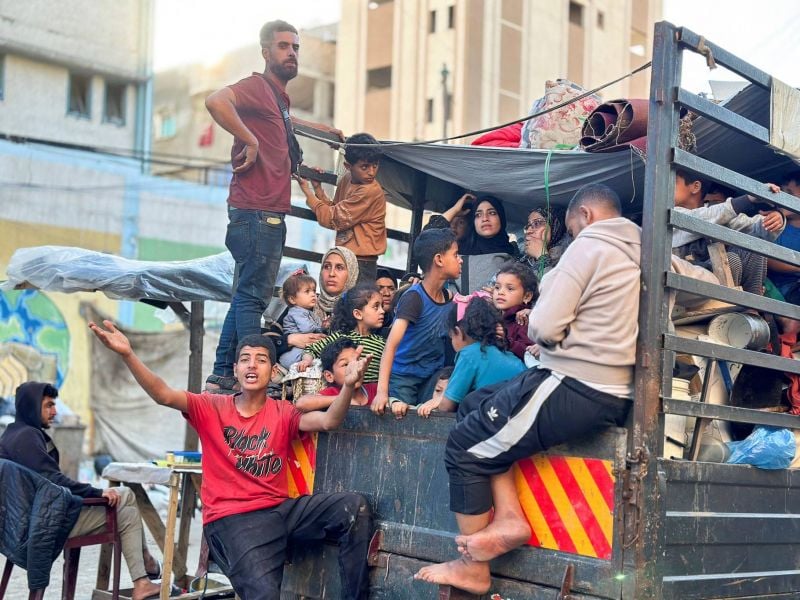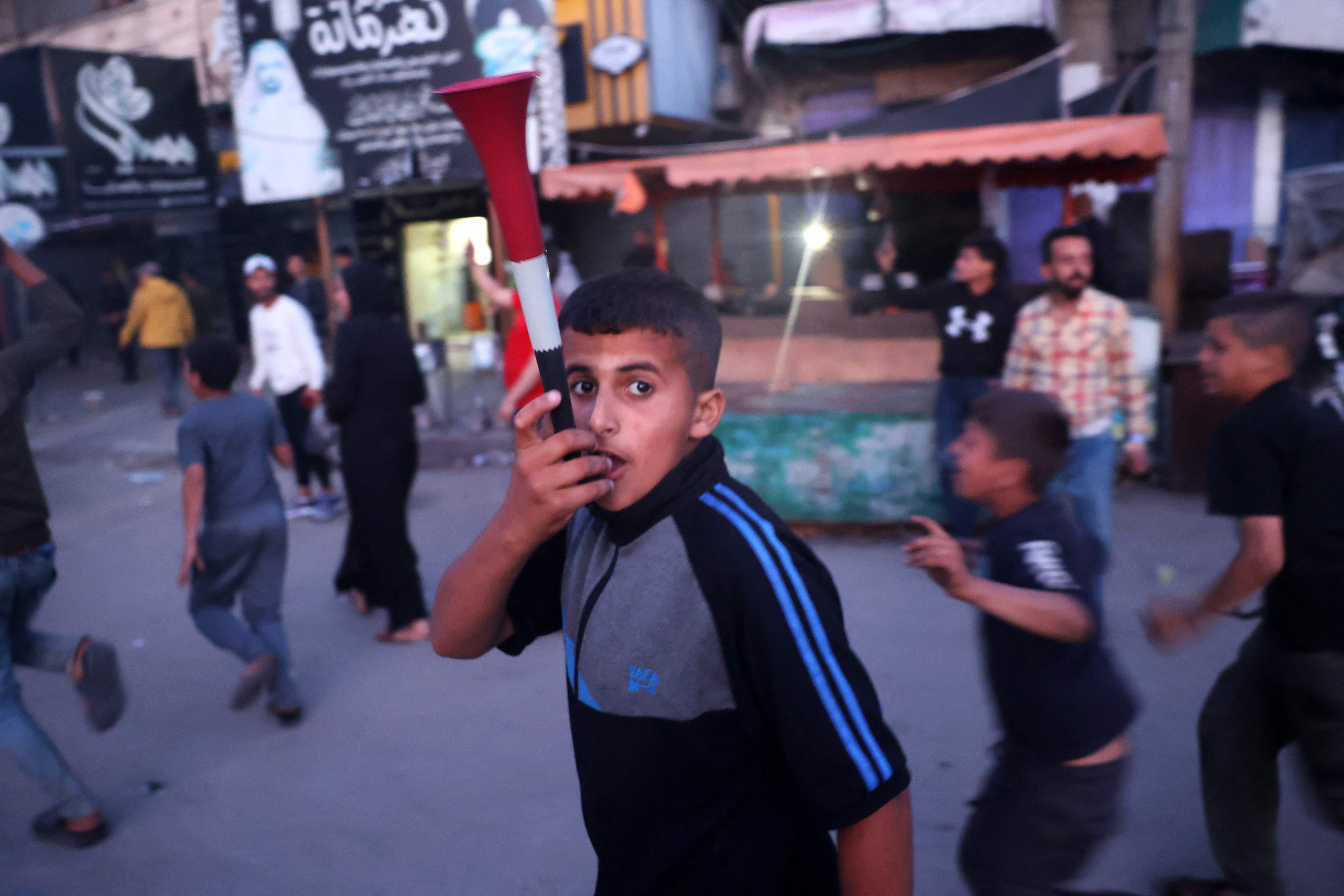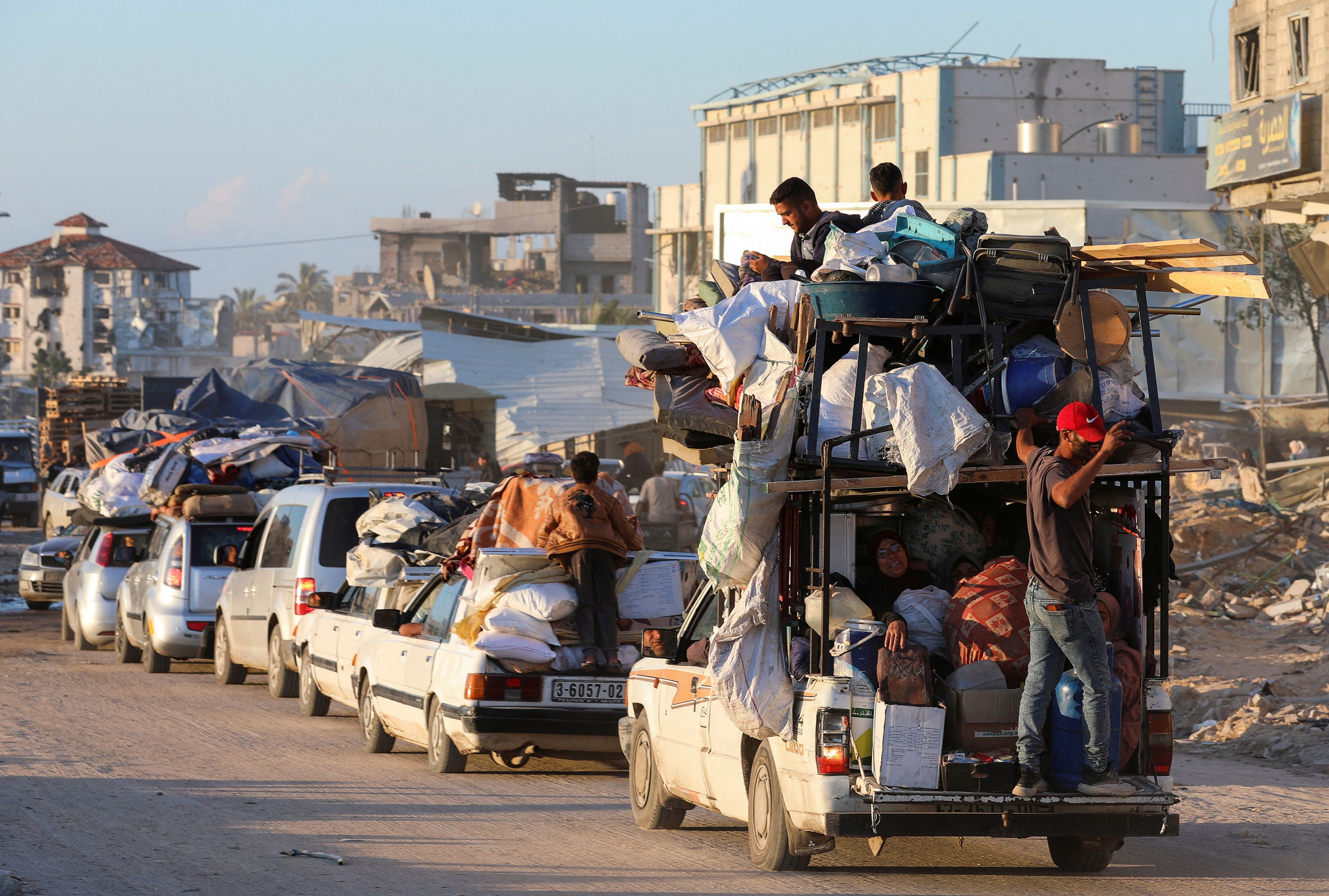
Displaced Palestinians, who fled Rafah after the Israeli military ordered them to evacuate from the eastern parts of the southern Gazan city, ahead of a threatened assault, in Khan Younis in the southern Gaza Strip May 6, 2024. (Credit: Ramadan Abed/Reuters)
BEIRUT — For Remas Hmayed, a mother of five, Monday started like “normal day in Gaza — well, whatever normal has been for the past seven months of our lives.”
“We had been hearing that Hamas and Israel were negotiating a potential ceasefire for the past few days but we tried not to get our hopes up. We had been let down before.”
On Monday evening, Hamas announced it has accepted a truce proposal. Hamas leader Ismail Haniyeh informed mediators Qatar and Egypt that his side had accepted their proposal for a ceasefire in Gaza after seven months of bloodshed after Israeli bombardments killed 35,000 people — half of whom are women and children, following Hamas’ Oct. assault that killed 1,200 people with 252 others taken hostage.
Around two months ago, possible talks of a ceasefire had pushed Gazans to the streets in celebration, but a deal did not materialize.
 Palestinians celebrate in a street in Rafah, in the southern Gaza Strip, after Hamas announced it has accepted a truce proposal on May 6, 2024, amid the ongoing conflict between Israel and the Palestinian militant group Hamas. Hamas leader Ismail Haniyeh on May 6, informed mediators Qatar and Egypt that his Palestinian militant group had accepted their proposal for a ceasefire in Gaza after nearly seven months of war. (Credit: AFP)
Palestinians celebrate in a street in Rafah, in the southern Gaza Strip, after Hamas announced it has accepted a truce proposal on May 6, 2024, amid the ongoing conflict between Israel and the Palestinian militant group Hamas. Hamas leader Ismail Haniyeh on May 6, informed mediators Qatar and Egypt that his Palestinian militant group had accepted their proposal for a ceasefire in Gaza after nearly seven months of war. (Credit: AFP)
 Displaced civilians fleeing Rafah on May 6, 2024. (Credit: Ramadan Abed/Reuters)
Displaced civilians fleeing Rafah on May 6, 2024. (Credit: Ramadan Abed/Reuters)
Hmayed has been sheltering with her five children in Rafah, along the southernmost boundary of the Gaza Strip since three months ago. She says that the last time she got her hopes up for a ceasefire, she started packing up her family’s belongings to leave their displacement camp. She also said goodbye to the “friends who became family, because adversity makes people closer.” Hmayed insisted on keeping in touch with them when they ”go back to their homes, whatever is left of them.”
This time around, she was wary. When Hamas announced on Monday afternoon that it had agreed to a ceasefire proposal Hmayed watched with other displaced Gazans as Israeli hostage families rose in protest to pressure Netanyahu’s government to accept the offer.
Candies and zalghoutas
Others weren’t as cautious. Hmayed recalls children doing cartwheels among the tents, and an improvised piñata to bring joy to the kids was used.
Videos circulating on social media platforms showed Gazans rejoicing, clapping and cheering.
As for the “piñata”: A tall man stacked three chairs, stood on top of them and started throwing candies to the kids who swarmed around him, collecting as many candies as they could, Hmayed says.
Old women were doing zalghoutas — long, high-pitched trills of joy — prostrating on the floor thanking God. But then, in the middle of this, they heard the too-familiar sound of airstrikes.
Israel had resumed bombing Rafah.
Hmayed hands the phone to her 10-year-old son Mohammed Ayoub.
"It was like a scene from a sick, sick movie, one that we had been living in for what seems like forever. I can't even remember the life I had before," Ayoub tells L'Orient Today.
Ayoub didn't even cry or panic or move — at this point he has become numb to it all, according to his mother.
"I didn't know whether to laugh or cry. I have been numbed. We have been played by Israel who did not take into consideration Hamas's acceptance of a ceasefire deal," Hmayed says.
With nowhere else to go and no car to try fleeing Rafah as Israel started urging people "to evacuate," the family of six are currently "in the hands of God and remaining in Rafah. Basically waiting for the land incursion to happen," Hmayed says.
On Tuesday, Palestinian journalist Muath Jehad, who lives in Gaza, wrote on Instagram: "Today we buried my little boy who was jumping yesterday from happiness after we heard good news about a ceasefire."
'After the war I want a full night's sleep'
Islam Marzouk, 19, is sheltering alone in Rafah, after her parents and three siblings were killed in an airstrike in January. She says she was hopeful that the ceasefire would materialize on Monday.
“I wanted the war to be over and I wanted to be able, after everything I had gone through, to have at least one night of full sleep without the sounds of bombing,” she tells L’Orient Today.
“It might seem silly with everything that has happened in the past seven months to say that all I'm looking forward to is a full night's sleep but really, that's all I want.”
Was she disappointed when Israel refused the ceasefire?
“Of course I was — who wants death and destruction? But it’s Israel and I’m used to disappointment by now. Still, I’m a woman with faith. I think Hamas will keep pushing for a ceasefire and when it happens inshallah [God willing] I will have a full night’s sleep and then find a good man to marry. I need to make a family after losing mine,” she says.
‘Not afraid of meeting God’
Hajje Dunia Faiz, an elderly woman from Gaza, is sheltering in the same area of the displaced camp in Rafah, a few makeshift tents from Hmayed and her children. She tells L’Orient Today she believes her time has come, and she “is not afraid of meeting God.”
On Monday, the Israeli army ordered 100,000Palestinians to leave Rafah amid growing fears of a ground assault on the southern Gaza city, where 1.4 million people displaced by Israel’s war on Gaza have sought shelter. The Israeli army also dropped leaflets over Rafah, urging “civilians to evacuate.” Gazans and international humanitarian organizations have repeatedly said that civilians in Rafah have nowhere to go and that no place in the besieged strip is safe from Israeli bombardments.
Netanyahu’s government claims that they can only achieve “total victory” in the war by conducting an offensive on Rafah, to eliminate four remaining Hamas battalions. On Monday, US President Joe Biden told Netanyahu in a phone call that he would not support a ground offensive in Rafah without a clear plan to protect civilians. Meanwhile the EU’s top diplomat, Josep Borrell, called Israel's Rafah evacuation order “unacceptable.”
In mid-October, the Israeli army ordered all civilians in northern Gaza to evacuate to areas south of Wadi Gaza (in the central part of the Strip) “for your own safety and the safety of your families” as the Israeli continued “to operate significantly in Gaza City and make extensive efforts to avoid harming civilians.”
However, some Palestinians who followed the evacuation warnings and fled their homes in search of safety suffered the very fate they were running from: Israeli airstrikes killed them outside of the evacuation zone.
As war rages in Gaza, civilians have repeatedly been told by Israel to go to the city of Deir al-Balah, in the center of the enclave, for safety. However, Deir al-Balah has also been repeatedly struck.
Israel has repeatedly bombarded areas of the strip that it had marked as “safe zones,” killing civilians.